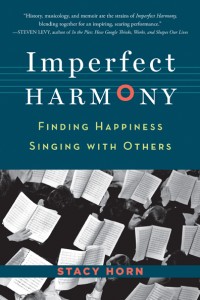By GALA Expert
November 30, 2023

Posted on: September 27th, 2013 by GALA Communications

GALA Choruses had a chance recently to interview author Stacy Horn about her new book Imperfect Harmony.
Why do we sing? For Stacy Horn, singing in a community choir–the Choral Society of Grace Church in New York–is the one thing in her life that never fails to take her to a transcendent place and remind her that everything good is possible. She’s not particularly religious and (she’ll be the first to point out) her voice isn’t exactly the stuff of legend, but like thousands of other amateur chorus members throughout this country and the world, singing with other people makes her happy.
GALA: How did you come to sing with the Choral Society of Grace Church? What is your first memory of singing with the choir?
SH: I was in my twenties; I’d hit bottom in my life; and I was desperate for a way to feel better. The choir director must have seen that naked need in my eyes, because I told him I didn’t have a particularly nice voice and after hearing me sing he agreed with me. But I could sing in tune, he said, so “Welcome to the choir!”
At the first rehearsal, we were all given copies of Handel’s Messiah. “Wait, what?” I thought we were going to sing Christmas carols! I was there because once, in high school, I joined my boyfriend’s choir over the holidays and we sang Christmas carols. It was fun. That was all I was looking for. A little relief. The Messiah score, however, is 230 pages long and each page is packed with notes going all over the place, and “you gotta be freaking kidding me,” I thought.
The director lifted his baton, the people around me began to sing, and I tried not to have a panic attack. After a while though, I got the hang of turning the notes into song. And with that my whole musical world changed. This was way, way, way, past fun. Since that night, singing has become the one thing in my life where feeling good is pretty much guaranteed, and I’d have to wrack my brain to find anything else in my life so completely sure-fire.
GALA: What role did singing play in your life before your time singing at Grace Church? How was music in your life when you were growing up? How does that affect your involvement with music now?
SH: It’s night and day. Singing was a casual, fun thing I did most of the time alone in my room or car or occasionally with other people. Also, the music I sang was great in its way but nothing like what I sing with my choir. Now I’m singing pieces that are so magnificent it’s almost too much to bear sometimes. And I’m singing with people who are every bit aware of this as I am. When I’m singing a beautiful piece of music and I’ve got a tenor to my left and maybe a bass or alto to my right (I’m a soprano) and all the different voice parts are swirling around me and everyone is blending exactly right, trust me – we are all thrumming with pleasure, both physically and emotionally. It’s a rush, like falling in love. Your involvement with music, with living really, goes up many orders of magnitude.
GALA: What effect does singing together have on a community?
SH: When you regularly have the experience I describe, it not only intensifies the bonds you have with your choir but with humanity as a whole. It connects you to your fellow singers, the conductor, the composer, the audience, and indirectly to anyone who has ever sung or heard this music before. I found a 1977 Grace Church newsletter which read, “We do not doubt that there are needs which run deeper than words, deeper even than thought, and that some of them may be reached by the power of music.” To regularly share something that is beyond words and addresses these needs creates understanding. Understanding enhances community.
GALA: Why do you think it is that people choose to sing together?
SH: Because once you have that experience you want it again. I have an amazing quote that sums it up. It’s from a book called A Philosophy of Music Education, by Benett Reimer:
“The power of such experience is so great and its satisfactions so deep that those who have shared it are likely to be changed fundamentally in their relation to music. For such people music inevitably becomes a source of some of life’s deepest rewards. This is no small matter, given the universal need for such satisfaction and its rarity in human life.”
In a world that sometimes contains such unbearable pain, one of the most healing things one can do is let loose beauty. This is why so many people came together to sing after 9/11, or the recent bombings in Boston. Singing helps people manage these feelings. Group singing is particularly effective because it is a beauty that can only be brought forth by intense cooperation.
GALA: Many members of the LGBTQ choral movement find, and have found, community and comfort in their chorus when it was hard to find elsewhere. What do you think it is about a choral community that makes this possible?
SH: It’s one of the most transcendent forms of group joy we have. Close your eyes and all you know of the people around you is that which comes from the deepest and best part of themselves. Singing is the ultimate communion. Actually, the answer to this question is really a culmination of all the answers I’ve given so far: singing amplifies joy, alleviates sorrow, and lets loose something beautiful in the world, something which can only be brought forth by intense cooperation.
Also, to be completely realistic, sadly singing doesn’t transform everyone or transcend all differences. I wrote about a choral society in the 19th century that dragged a black congregation and choir out of a church when abolitionist and anti-abolitionist tensions were becoming increasingly inflamed. Just a few weeks before the men who started the riot had sung Handel’s Messiah. One week they sang for hours about the “Prince of peace,” and the next they’re attacking black singers and busting up a church.
GALA: Can you think of a time when singing with your choir was a refuge for you?
SH: I’ve sung through every challenge in my life, the deaths of friends, relatives, pets, 9/11. The important thing to know is when you sing, you become what you sing. The voice is an instrument but it’s a very personal instrument, and you literally channel the music through your body. When Brahms wrote music to accompany the line, “Blessed are they that mourn: for they shall be comforted,” he poured every bit of his genius into expressing the solace promised in those words. You sing it and it flows through you, elevating you with the strength of his conviction.
GALA: In your experience how do choirs, or singing communities, change over years of singing together?
SH: When you work on a piece of music together, especially a particularly challenging piece, you’re going to make mistakes. Mistakes in choir rehearsals are very public. The people around you are going to hear them, which sometimes messes them up and causes them to make a mistake. It’s such a vulnerable place to be in, but there’s something beneficial about being regularly put in this position. Your need for tolerance and acceptance while you learn makes you more tolerant and accepting of others. In this way, singing regularly not only makes you a better singer it makes you a better person. And going back to community, that kind of sustained effort, regularly working through mistakes together, all to create something beautiful, is part of what builds bonds between singers.
GALA: How has singing with a group of people for many years changed you? How has it affected your relationships?
SH: Not long after joining the choir I took singing lessons to address my insecurity about my voice. My teacher, who was the associate conductor at the time, played a recording of our choir singing. I was blown away at how good we were. “I can’t get over how gorgeous we sound,” I told her. She looked at me and said, “Your voice is in there.” Whatever I thought of my voice, it was contributing to that sound.
I learned that in order for the pieces we sing to work, all the voices must blend. You don’t want to over-sing, a room full of soloists just sounds cacophonous. But you also can’t hide. Every voice must be heard just enough to truly create, hear and feel the harmony. To keep the right blend alive you have to listen as much as you sing. Between these two revelations I finally understood the value of my own contribution and how it fit in with everyone else’s in the choir.
GALA: Do you have any additional thoughts that might be relevant to members of LGBTQ choirs?
SH: I have a feeling everyone already intends to do so, but keep singing for as long as you can. It will help you grow older in better health. One of the big things science has found is that music relieves stress. Chronic stress leads to things like Alzheimer’s, dementia, anxiety and depression. Singing, though, releases the hormone oxytocin, which manages anxiety and stress and enhances feelings of trust and bonding. Singers were found to have lower levels of cortisol, indicating lower stress. Singing is also good for the brain, enhancing neuroplasticity and increasing gray matter and the number and strength of neural connections. So, keep singing.

Stacy Horn is the author of four nonfiction books. Bestselling author Mary Roach has hailed her for “combining awe-fueled curiosity with top-flight reporting skills.” Her commentaries have been heard on NPR’s All Things Considered, and she is the founder of the social network Echo. She lives and sings in New York.
